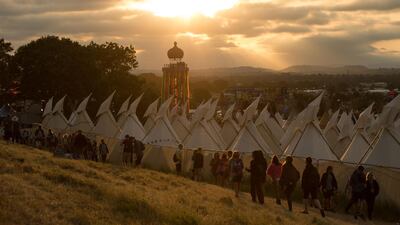Last week, it was confirmed that the 2021 Glastonbury festival was cancelled because of the Covid-19 pandemic. However, that doesn't mean music lovers will necessarily go without entertainment from Worthy Farm this June.
Organiser Emily Eavis has suggested that a live-streamed event could take place this summer.
"A lot of big artists have been in touch offering to perform for us at the farm," Eavis, 41, told The Guardian.
"We would love to build a show that can be watched at home by people all over the world."
Both the 2020 and 2021 festivals have been cancelled owing to the pandemic. However, Eavis, daughter of Glastonbury founder Michael Eavis, said organisers had explored "every avenue" to try and bring the festival to life this year.
“Everything from restrictions on public transport capacities to availability of the medical staff we need to work at the event, to the simple fact that mass gatherings are currently still legally prohibited and it’s not at all clear when that will be reversed,” she said when explaining the decision to cancel the 2021 event.
“We would have been in trouble if we’d hedged our bets and pushed on regardless to March and then had to cancel. We’d have spent a lot of money by then, money which we wouldn’t get back.”
“So many livelihoods depend on this event and that’s why we desperately wanted to make it happen,” Eavis added. “All of us at the farm are just a tiny part of an enormous web of people who rely on the festival.”
In 2020, Glastonbury is estimated to have lost £5 million ($6.8m) when it pulled the plug in March, as construction was already underway to make the 50th anniversary of the festival happen. This year's losses "will not compare", Eavis says, however a virtual event would "of course be a useful way for us to make some very welcome income."
In December, the Eavis called on the UK government for financial support to help save the 2021 festival.
"In a usual planning cycle we would already be well into organising the next festival," she told The Sunday Times.
“The best solution would be for the government to offer … direct financial support in the event of Glastonbury, and other events, being forced to cancel once they’re well into the preparations.”
Glastonbury Festival, which first took place on Worthy Farm in Pilton, Somerset, England in 1970, is one of the world’s largest and most prestigious festivals, with 200,000 revellers attending each year. Acts such as The Rolling Stones, Adele, Beyonce and David Bowie have headlined the legendary Pyramid Stage in the past.
A message from the organisers on the festival's website currently reads: "We are very confident we can deliver something really special for us all in 2022!"


